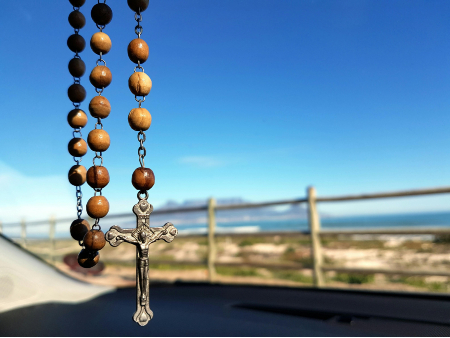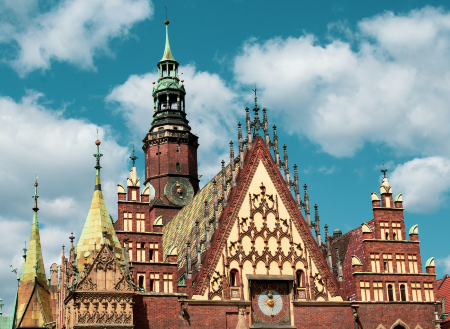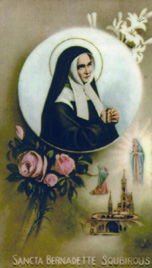Ireland's Soul-Searching About Vocations: An Interview With Father Kevin Doran
FREE Catholic Classes
Interview With Father Kevin Doran
DUNDRUM, Ireland, OCT. 24, 2003 (Zenit) - The Catholic Church in Ireland didn't need to worry about promoting vocations to the priesthood in the past. But now the local Church is determined to plan for a future full of hope -- which includes an adequate number of priests.
Vocations personnel from 20 dioceses in Ireland gathered a few weeks ago to discuss how to focus the emphasis on vocational promotion, accompaniment and discernment, rather than on recruitment.
Father Kevin Doran, national coordinator for diocesan vocations, shared with us the resolutions from the conference and his aspirations for the years ahead.
Q: What are the trends in terms of the numbers of vocations to the priesthood in Ireland?
Father Doran: The number of diocesan priests in Ireland is about the same as it was 100 years ago, but the age profile is higher and the demands of the ministry have changed somewhat.
There was a surge in vocations to the priesthood in the 1950s and 1960s. The trend has been downward for about 20 years, but more sharply for the past 10 years or so. There are some signs that this downward trend may be leveling out.
In the Dublin Archdiocese, which has about a quarter of the population of Ireland, the number of seminarians has grown slightly over the past four years. At present, there are 80 men in formation for diocesan priesthood in Ireland. Three-quarters of these are at St. Patrick's College in Maynooth.
Q: What will be the emphasis in vocations ministry in the years ahead?
Father Doran: Vocations personnel in Ireland are committed to the fundamental principles of the document "In Verbo Tuo," which arose out of the European Continental Congress on Vocations in 1997. This involves a shift in emphasis away from recruitment and toward promotion, accompaniment and discernment.
Our task is twofold. First, it is to stimulate the development of a culture of vocation in the Church and to establish structures that will support people in discerning God's call in their lives.
The second aspect is to actively and confidently promote the vocation to priesthood as a particular way of living and serving, to which God continues to call some men today.
This responsibility cannot be carried out by solitary "vocations scapegoats," to use the terminology of "In Verbo Tuo." If vocation is for all, then all must be involved in mediating the call of Christ.
The diocesan vocations directors recently had a four-day meeting and we identified four groups with whom we want to engage more particularly in the next few years.
We want to support priests in rediscovering their own original motivation to become priests and invite them to share that vision with their parishioners. We want to work with school-based catechists, chaplains and guidance counselors to see how we can engage more effectively in a discernment model with the school-going population.
We identified third-level education as a context that could be especially fruitful for vocations ministry. We decided to explore, along with the chaplains in third-level colleges, how vocations ministry could have a presence or a point-of-contact on campus.
And we decided to ask the Irish bishops to re-examine the role of vocations directors and consider how it could be prioritized in each diocese, with particular reference to the allocation and the training of personnel.
The use of the Internet has resulted in frequent contacts from people overseas who inquire about becoming priests in Ireland. We agreed that the systematic importation of candidates for the priesthood is not an appropriate way to resolve the vocations issue. It would imply that Irish people could continue to have the ministry of priests without taking the responsibility for nurturing vocations.
Ireland has, however, seen significant immigration in recent years. We agreed that it would be a healthy thing for this new diversity in our population to be reflected in the seminaries.
Q: Ireland had a lot of economic success in the 1990s. How did that change the expectations of youth and their attitudes toward religious or priestly vocations?
Father Doran: Ireland's first economic revival was in the 1960s. While it was short-lived, it created certain expectations among the present generation of parents. People's ideas have changed with respect to what constitutes success and what will bring happiness and enhance social status.
This change of attitude, together with the new opportunities arising from the more recent economic growth of the 1990s, has inevitably influenced career choices.
There are some indications, however, that young people in their late 20s and in their 30s have also seen the limitations of this more materialistic culture and have begun to look beyond it. It is from this age group that most of our candidates for priesthood are coming at present.
Alongside the more materialistic culture, there is a general decline in the willingness of people to make long-term commitments. Many young people who want to deepen their relationship with God and serve others are still slow to embark on the journey of priesthood or religious life.
Q: Is it easy to engage in vocations ministry in Ireland? What are the particular obstacles?
Father Doran: There are many structures in Ireland that would appear to make vocations ministry easier, particularly the well-established Catholic education system and the relatively high Mass attendance. The fact that most vocations personnel are also working full time in parishes or in other ministries does make it more difficult to devote time and creative energy to vocations ministry.
To some degree and in some ways, we could also be described as victims of our history. In the past, candidates for priesthood were quite numerous and vocations promotion seemed to be relatively unnecessary. As a local Church we have not yet properly adapted to the change in circumstances.
Vocations personnel meet with two rather frustrating attitudes: loss of confidence and shallow optimism.
The "doom and gloom merchants" proclaim that the whole enterprise is over and that the future will be a Church without priests. The "optimists" smile and wait for something to happen, because "things always work out in the end."
Christian hope, by contrast, involves both trusting in God's fidelity to his people and having firm determination on our part to respond to that fidelity by actively seeking his will.
Arising possibly out of an earlier history of religious persecution, one of the characteristics of Irish Catholicism in the 20th century has been a tendency to put priests "on a pedestal." This has probably contributed to the development of a Church that, up to recently, was over-clerical and over-institutional.
 Hi readers, it seems you use Catholic Online a lot; that's great! It's a little awkward to ask, but we need your help. If you have already donated, we sincerely thank you. We're not salespeople, but we depend on donations averaging $14.76 and fewer than 1% of readers give. If you donate just $5.00, the price of your coffee, Catholic Online School could keep thriving. Thank you. Help Now >
Hi readers, it seems you use Catholic Online a lot; that's great! It's a little awkward to ask, but we need your help. If you have already donated, we sincerely thank you. We're not salespeople, but we depend on donations averaging $14.76 and fewer than 1% of readers give. If you donate just $5.00, the price of your coffee, Catholic Online School could keep thriving. Thank you. Help Now >
Western culture is less favorably disposed toward institutions these days and with good reason in some cases. Priesthood probably appears unattractive to some because it is "institutional," and to others because it is no longer institutional or comfortable enough.
Q: What are the major pastoral challenges facing the Church in Ireland?
Father Doran: The challenges are many, but two in particular come to mind. In the secular culture, the concept of education as a lifelong enterprise is well established. The Church has invested enormous resources in Catholic education and in school-based catechesis.
But catechesis should also be lifelong -- the Sunday homily on its own is not sufficient to provide the nourishment needed by mature adult Catholics. For that reason, I would like to see the development of a comprehensive strategy for parish- or community-based adult catechesis.
A challenge that Ireland and many countries face is the phenomenon of growing urbanization and the corresponding depletion of population in rural parts of the country. Thus, the Church is called to be a community of faith where the possibility of any form of community has become more difficult.
The lack of young people in many rural communities and their frequently "un-rooted" presence in urban areas challenge the Church to find new ways of engaging with them. This also has implications for vocations ministry.
Q: How has Pope John Paul II's pontificate affected the Church in Ireland?
Father Doran: Ireland was one of the first countries Pope John Paul visited during his pontificate. He was very warmly received and his intervention was very relevant. But there would be a perception that the Church here didn't build very effectively on the foundations he laid.
In his encyclical letter "Veritatis Splendor" the Pope speaks about the rich young man who went away sorrowful because he found the challenge of discipleship too demanding. Ireland also has its share of people for whom the cost of discipleship seems too high.
But, as the name of the encyclical implies, the truth is attractive. People who seriously want to follow Christ are greatly encouraged by Pope John Paul's ministry, because they see his integrity and his courage. He is someone who speaks the truth, even when it is challenging or perhaps unpopular, and he speaks it with love.
He strikes a spiritual chord in the hearts of young people, as evidenced by the large numbers who regularly respond to his invitation to participate in the World Youth Days.
The Pope's ministry has also had an impact on vocations promotion. His deep respect for the sacredness of the human person, his passion for justice and peace, his love of the Eucharist and his fidelity to his own vocation are among the factors that prospective candidates have identified as sources of inspiration in their own vocation journeys.
Contact
Catholic Online
https://www.catholic.org
CA, US
Catholic Online - Publisher, 661 869-1000
info@yourcatholicvoice.org
Keywords
Vocations, Priests, Father Kevin Doran
More Catholic PRWire
Showing 1 - 50 of 4,716
A Recession Antidote
Randy Hain
Monaco & The Vatican: Monaco's Grace Kelly Exhibit to Rome--A Review of Monegasque-Holy See Diplomatic History
Dna. Maria St. Catherine Sharpe, t.o.s.m., T.O.SS.T.
The Why of Jesus' Death: A Pauline Perspective
Jerom Paul
A Royal Betrayal: Catholic Monaco Liberalizes Abortion
Dna. Maria St.Catherine De Grace Sharpe, t.o.s.m., T.O.SS.T.
Embrace every moment as sacred time
Mary Regina Morrell
My Dad
JoMarie Grinkiewicz
Letting go is simple wisdom with divine potential
Mary Regina Morrell
Father Lombardi's Address on Catholic Media
Catholic Online
Pope's Words to Pontifical Latin American College
Catholic Online
Prelate: Genetics Needs a Conscience
Catholic Online
State Aid for Catholic Schools: Help or Hindrance?
Catholic Online
Scorsese Planning Movie on Japanese Martyrs
Catholic Online
2 Nuns Kidnapped in Kenya Set Free
Catholic Online
Holy See-Israel Negotiation Moves Forward
Catholic Online
Franchising to Evangelize
Catholic Online
Catholics Decry Anti-Christianity in Israel
Catholic Online
Pope and Gordon Brown Meet About Development Aid
Catholic Online
Pontiff Backs Latin America's Continental Mission
Catholic Online
Cardinal Warns Against Anti-Catholic Education
Catholic Online
Full Circle
Robert Gieb
Three words to a deeper faith
Paul Sposite
Relections for Lent 2009
chris anthony
Wisdom lies beyond the surface of life
Mary Regina Morrell
World Food Program Director on Lent
Catholic Online
Moral Clarity
DAN SHEA
Pope's Lenten Message for 2009
Catholic Online
A Prayer for Monaco: Remembering the Faith Legacy of Prince Rainier III & Princess Grace and Contemplating the Moral Challenges of Prince Albert II
Dna. Maria St. Catherine Sharpe
Keeping a Lid on Permissiveness
Sally Connolly
Glimpse of Me
Sarah Reinhard
The 3 stages of life
Michele Szekely
Sex and the Married Woman
Cheryl Dickow
A Catholic Woman Returns to the Church
Cheryl Dickow
Modernity & Morality
Dan Shea
Just a Minute
Sarah Reinhard
Catholic identity ... triumphant reemergence!
Hugh McNichol
Edging God Out
Paul Sposite
Burying a St. Joseph Statue
Cheryl Dickow
George Bush Speaks on Papal Visit
Catholic Online
Sometimes moving forward means moving the canoe
Mary Regina Morrell
Action Changes Things: Teaching our Kids about Community Service
Lisa Hendey
We ask you, humbly: don't scroll away.
Hi readers, it seems you use Catholic Online a lot; that's great! It's a little awkward to ask, but we need your help. If you have already donated, we sincerely thank you. We're not salespeople, but we depend on donations averaging $14.76 and fewer than 1% of readers give. If you donate just $5.00, the price of your coffee, Catholic Online School could keep thriving. Thank you.Help Now >
Easter... A Way of Life
Paul Spoisite
Papal initiative...peace and harmony!
Hugh McNichol
Proclaim the mysteries of the Resurrection!
Hugh McNichol
Jerusalem Patriarch's Easter Message
Catholic Online
Good Friday Sermon of Father Cantalamessa
Catholic Online
Papal Address at the End of the Way of the Cross
Catholic Online
Cardinal Zen's Meditations for Via Crucis
Catholic Online
Interview With Vatican Aide on Jewish-Catholic Relations
Catholic Online
Pope Benedict XVI On the Easter Triduum
Catholic Online
Holy Saturday...anticipation!
Hugh McNichol












 Daily Readings for Tuesday, April 16, 2024
Daily Readings for Tuesday, April 16, 2024 St. Bernadette: Saint of the Day for Tuesday, April 16, 2024
St. Bernadette: Saint of the Day for Tuesday, April 16, 2024 Prayer for our Family #1: Prayer of the Day for Tuesday, April 16, 2024
Prayer for our Family #1: Prayer of the Day for Tuesday, April 16, 2024

